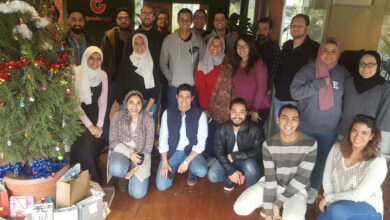
Mobile apps are detecting skin cancer. Drones are delivering aid across continents. Artificial intelligence is disrupting every aspect of our lives. The venture capital world is no exception.
VCs are heading in the same direction, where AI augments human intelligence. Lately, VCs have been following more or less the same pattern. They are waiting longer to see some startup traction. But this entails seeing a significant increase in the valuation of the startup. Even worse, they could end up excluded from the next funding round. AI can change these dynamics. It can help investors find promising startups in earlier rounds, pre-traction if necessary.
This will open the door to SV. It will provide opportunities for investors and family offices from the Middle East. It will decentralize venture capital with new investors from all over the world. They may not have local expertise. But they come armed with data-driven investment decisions. The SV early-stage startup investment space may no longer be in the hands of a few.
Catching the AI wave
The VC world is changing fast. Many are exploring the rising popularity of data-driven investing. They are building their investment portfolios the Moneyball way.
A KPMG report puts total investments in Q1 this year at USD 49 billion across 2,661 global deals. The report noted that AI and Machine Learning are the center of VC attention. More companies are integrating such enabling technologies into their solutions. And more investors are becoming aware of their disruptive potential.
Data-driven VC Funds are on the rise. Key players include Correlation Ventures, SignalFire, and Google Ventures. More and more platforms are positioning themselves as trusted data providers. The go-to place for information on early-stage startups. Famous among those are CB Insights, Crunchbase, and Pitchbook.
Changing the traditional model
More VCs are using AI in their deal sourcing and selection to catch the next Airbnb or Facebook. It’s not a coincidence that SV is getting more data-hungry. Several companies are working with investors on honing data-driven decision-making. This includes Aingel, an AI startup I co-founded in 2016 with my Master of Science colleagues at NYU. It’s where we envisioned an algorithm that predicts the success of brand-new startups.
VCs are taking a more data-driven approach toward investment decisions in Silicon Valley. This is where Aingel comes in. We help investors find those diamonds in the rough. Our team of data scientists is currently using a patent-pending algorithm. They score startups and match them with ideal VCs most likely to invest in their stage and space. This will help VCs focus on the next disruptive startups. It will attract more investors to Silicon Valley. More money is poured into fewer startups, especially in the early stages.
Stepping Stone to SV
The data-driven investment models are an opportunity for new investors. They can enter, compete and succeed in Silicon Valley – a field dominated by few, big local players. Quality deal flow is important for both local and international investors. The more we use data, the better we are at finding and investing in great startups. This is before they even show traction and get popular among other investors. Our algorithms show that we can reduce portfolio risk and improve returns by 2.5x.
Data-driven investing has the potential to open up Silicon Valley to the world. This will bring in a new funding channel that can fill the fundraising void for early-stage startups. Several investors from the Middle East would love to hop on. They would not hesitate to invest in the next game-changing startups in Silicon Valley. All they need is deal flow, data, and access.
Beyond investing
Besides opening up investment opportunities here, AI is creating jobs back home. There is ongoing rhetoric about the impact of AI on unemployment. But AI can also provide global employment and cultivate future talent.
Let’s take Egypt as an example. Current data show a growing population approaching 100 million with a median age of 24. National statistics for employment in Egypt tell an interesting story. During such economic hardship, unemployment dropped 11.8% in 2017, down from 12.5% the previous year.
The country’s young tech talent can make use of remote work opportunities. They can contribute to disruptive technologies anywhere in the world. This will also reflect on their expertise and skills as they work on the latest in the tech field.
At Aingel, we are hiring around 42 data researchers based in Cairo. We tried Amazon Mechanical Turk for aggregating data. But we discovered a need for more nuanced data. Most of my remote team works on aggregating startup founders’ data. We use this data in our work at Silicon Valley with top international and US investors.
The VC world is investing in potential future disruptive startups. Our talent is setting the gears in motion and getting the job done. We hope data-driven investing will encourage VCs from the region to make it in Silicon Valley.
Amr Shady
Amr is the Co-founder and CEO of Aingel Corp., a spin-off from his research on predicting startup success at New York University. Aingel works with top Silicon Valley and international VCs to scale their deal flow sourcing and selection process. Its algorithms also help promising startups fundraise faster by identifying best-matching VCs. Aingel’s investors include Silicon Valley Bank, 500 Startups, Endure Capital, BECO Capital and OTG Ventures. Amr has over 18 years of experience in building and scaling companies. He founded TA Telecom at 22 and bootstrapped it with $50,000 to millions in revenue. He earned several international awards, including Deloitte’s Technology Fast 500 EMEA. The Financial Times also dubbed his first startup a “local hero.” Amr is a board member of Endeavor and TechWadi, two non-profits promoting entrepreneurship. He earned his MSc in Business Analytics from NYU. He graduated from Dalhousie University with a BSc in Electrical Engineering.



